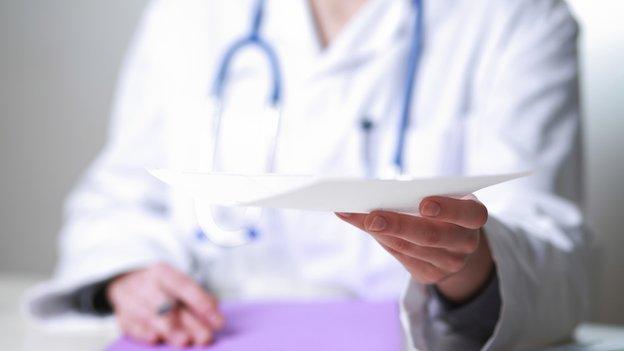'War of words' likely over seven-day GP opening
- Published

GPs are not happy with their lot - many of them anyway.
Complaints about the rising workload and lack of funding for primary care in England have been made loud and clear for some time now.
David Cameron's restated drive to make the NHS a fully seven-day-a-week service has added to their sense of grievance.
For the British Medical Association (BMA) to criticise the government over its handling of primary care is hardly new.
The BMA has already made clear its opposition to moving towards seven-day-a-week surgery opening before current shortfalls in staffing and resources are addressed.
But the tone of the speech by Dr Chaand Nagpaul, chair of the BMA's GP committee, represents an escalation of the rhetoric and a further souring of its relationship with Whitehall.
He refers to a "catastrophic timebomb ready to explode" in the shape of doctors leaving general practice. He says that without a turnaround in recruitment "we won't have a comprehensive general practice service in parts of the UK".
He talks of an "unashamed starvation of general practice" in terms of resources even as demand increases.
Government 'irrition'
The speech is peppered with phrases like "imploding under the strain", and "not just a perfect storm, but an absolute hurricane".
His members, he says, believe that workload pressures are damaging patient care.
Just three days after David Cameron set out his stall for the NHS in England in his first major speech of the election including the seven day pledge,
Dr Nagpaul calls on him to "jettison the political pipedreams of tomorrow".
He says its "absolutely pointless" promising 5,000 more GPs by 2020 if 10,000 retire in that time. Getting surgeries to open seven days a week is a "surreal obsession".
This is indeed hard-hitting stuff.
The government's irritation is all too clear in the Department of Health response which refers to the "doctors' union".
A spokesperson describes it as "an overly negative and pessimistic view". The statement says that thousands of GPs in England are already offering access seven days a week.
Saturday surgery 'dropped'
It is clear that there are innovative approaches at those practices which have received backing from the Prime Minister's Challenge Fund.
Some have grouped together to offer patients a walk-in service every day of the week.
Some, including a group in Birmingham visited by Mr Cameron on Monday, provide 12 hours a day access to GPs for patients on the phone.
But some doctors and practices regard the seven-day-a-week policy as a red herring.
One GP in Wiltshire tells me that his patients want and get their own GP from 8am till 6.30pm during the working week and are guaranteed an on the day appointment. So demand at the weekend is limited.
An experiment in opening on a Saturday morning was dropped because patients did not make use of it.
Simon Stevens, the head of NHS England, said in a speech this week that the service was entering the most challenging period in its 67 year history.
The Prime Minister is aware of that and hopes that his plan for a seven day NHS will help address that challenge. But it has not taken long for resistance to emerge.
The GPs will be hard to win over and a lengthy war of words seems likely.
- Published21 May 2015